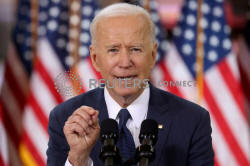|
Biden is attempting a delicate balancing act as he calls for a
reshaping of the nation's energy industry by reducing reliance
on fossil fuels and coal-powered electric plants to meet
aggressive climate emission goals.
Those industries offer high-paying, union jobs that Biden
promised to replace while courting the blue-collar vote on the
campaign trail.
"What we're trying to do here is put some real money where our
mouths are," Jared Bernstein, who serves on the White House
Council of Economic Advisers, told Reuters. "You don't just
train somebody for a job that might or might not exist. Instead,
you look around the corner and see where labor demand is going
to be next year."
A $40 billion job-training plan in the infrastructure proposal
would help workers who lost jobs through no fault of their own
land a new job in a growth industry, and direct income to help
them pay the bills while training and utilize case managers to
navigate the system, he said.
The training funding is part of a package of measures included
in Biden's plan that seeks to boost unions. The Democratic
president has promised to build union jobs in the United States,
which he sees as key to building back a stronger middle class.
In 2020, some 35 percent of public-sector employees could
collectively bargain for wages and benefits, while just 6.3
percent of the private sector was unionized. But roughly half of
U.S. states block public employees from collective bargaining.
That "is by far the biggest barrier," said a senior White House
official.
The White House wants to guarantee public workers across the
country the right to collective bargaining, expand apprentice
programs and ensure that all federally funded construction
projects use union labor.
Biden is seeking a further $38 billion in funding to expand
union apprentice programs, a gateway to a union job, which the
White House says will create 1 million to 2 million registered
apprenticeship slots, to fill the demand created by the spending
on new construction projects.
Biden and Democrats delivered on a high-priority item for unions
when they included an $83 billion pension bailout in the COVID
relief bill passed in March. Labor leaders, facing declining
enrollment that is crushing their self-funded retirement
systems, say the money will shore up to 200 plans.
(Reporting by Jarrett Renshaw; Editing by Peter Cooney)
[© 2021 Thomson Reuters. All rights
reserved.] Copyright 2021 Reuters. All rights reserved. This material may not be published,
broadcast, rewritten or redistributed.
Thompson Reuters is solely responsible for this content.

|
|





